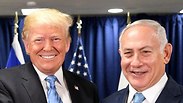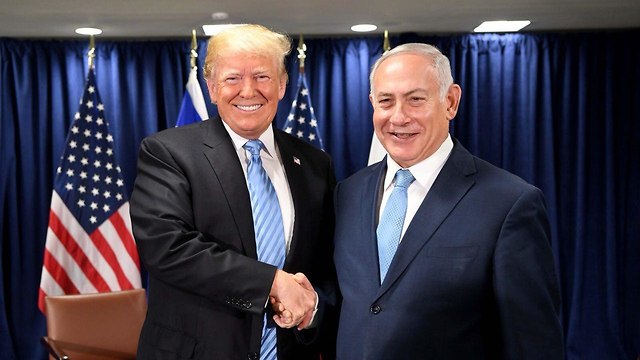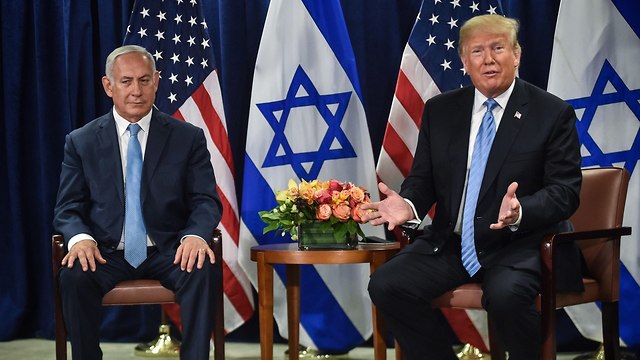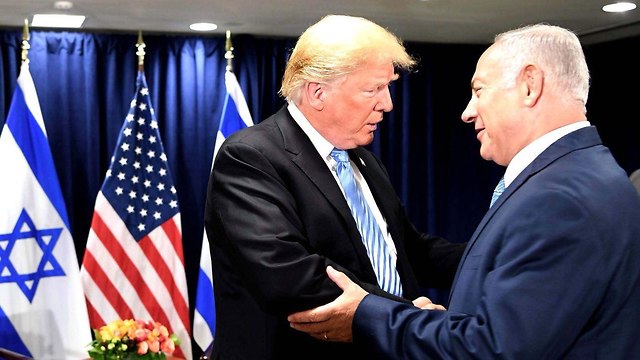
President Trump, PM Netanyahu
Photo: Gov. Press Office
Prime Minister Benjamin Netanyahu said he was not surprised by US President Donald Trump's statement at the UN on Wednesday that he "likes" the two-state solution and that he intends to present a peace plan within two to four months.
"This does not come as a surprise," Netanyahu said at a press briefing in New York after his meeting with the US President and a day before his speech at the UN General Assembly.
"We are conducting talks and I am prepared for the Palestinians to have the ability to defend themselves without the ability to threaten us. Except for Gaza, security control west of the Jordan River until the sea will remain in our hands. That is non-negotiable and will not change as long as I am prime minister. I am confident that any American initiative will include this principle," he added.
Netanyahu said that during his meeting with Trump, whose son-in-law and adviser Jared Kushner also took part, Kushner said that "everyone interprets the term 'state' differently." Therefore, the prime minister added, "I am dealing with the essence, not the description. The question is: what is a country? Whether it is Costa Rica or Iran, there are many possibilities," Netanyahu said.
"I am very pleased with the meeting with Trump and he expressed unqualified support for Israel's right to defend itself in Syria," Netanyahu said of the crisis with Russia following the downing of the Ilyushin aircraft and Russia’s transfer of the S-300 anti-aircraft system to Syria.
"I submitted specific requests to Trump in the context of recent events in Syria, and I received all I wanted — these are very important things," he added.
A senior political source said that negotiations between Israel and Russia are being conducted at various levels, and that the assessment is that when the mourning is over in Russia and the atmosphere clears, a meeting will take place between Netanyahu and Putin.
"On the one hand, it is vital that we continue to maintain contact with the Russians at all levels; but Israeli freedom of operations will not change, and in this respect we have the full support of Trump," said the prime minister.
According to the source, Israel turned to the Kremlin and suggested the option of a meeting between Putin and Netanyahu — a proposal that was not accepted, but was not rejected out of hand. Upon his return to Israel, Netanyahu is expected to call the Russian president and continue working for a meeting.
Netanyahu refused to comment specifically on the transfer of the S-300 missiles, but said that "the goals are to maintain coordination with Russia, but to allow Israel to defend itself, and this visit is very important in order to advance the second goal."
He repeated several times that he had received from Trump whatever he wanted.
Regarding the possibility that Trump would meet Iranian President Hassan Rouhani, Netanyahu said: "I do not know whether Trump will meet with Rouhani or not, but they are exerting maximum pressure on Iran, and I do not see that this will change. We are focusing on the greatest threat to the State of Israel and it does not come from Syria nor from what Iran is doing in Syria. It comes from what Iran is doing in Iran, and I do not lose focus on this objective."
The Prime Minister announced that he would not attend a UNESCO event being held on the sidelines of the General Assembly in protest of the organization's conduct.
Netanyahu also commented for the first time on the allegations of sexual harassment by his spokesman for the foreign media, David Keyes, and the claims that US Ambassador Ron Dermer should have reported these allegations in real time: "I am sure that Ambassador Dermer acted properly. The matter is being investigated by the Civil Service Commission," Netanyahu said.



















